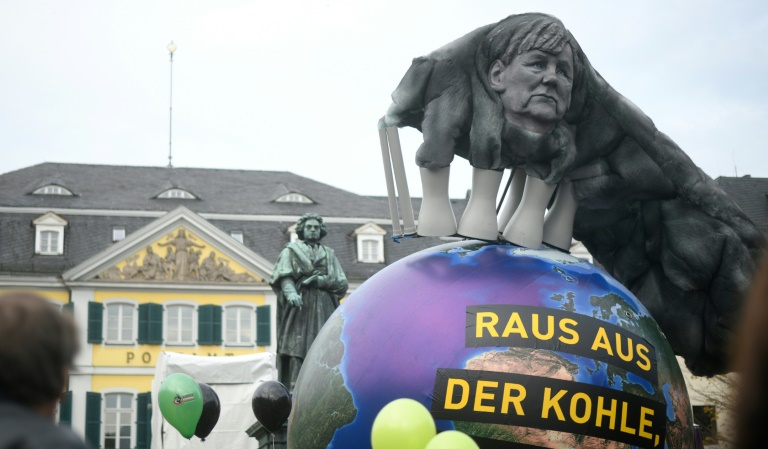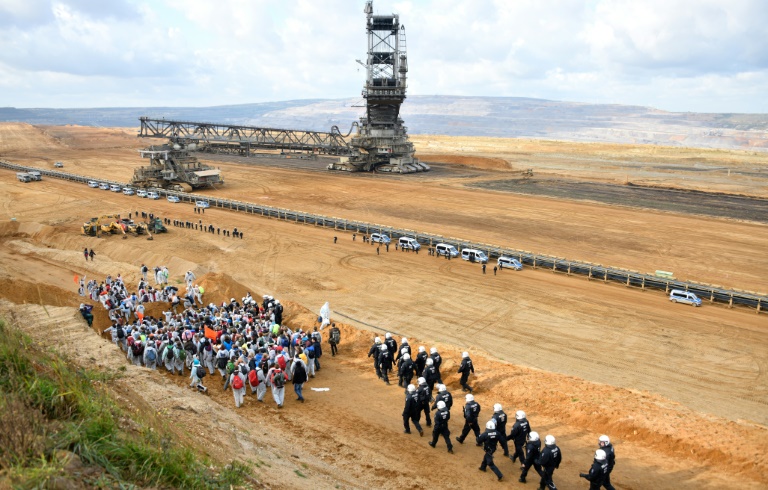Chiefs’ Dove – ‘This club deserves to be at the top’
Battles over dirty coal plants and the combustion engine have dogged her efforts to forge an unlikely three-way governing alliance with the Greens and pro-business Free Democrats (FDP).
They are also flashpoint issues as Germany and Fiji co-host UN climate talks in Bonn, which Merkel will address during a visit on Wednesday with French President Emmanuel Macron.
Critics charge that Merkel, a trained physicist who has often championed climate action on the world stage, tends to cave in to business and political interests when it matters.
Merkel has opposed stricter EU emissions limits for cars, fought planned diesel bans in cities suffering toxic air pollution and shelved a plan to get one million electric vehicles onto German roads by 2020.
Weekly newspaper Die Zeit harshly compared Merkel’s policies to that of climate change-denying US President Donald Trump, adding that “at least Trump is honest about it”.
– Emissions not falling –

An effigy of Merkel seen in the smoke coming out of a power plant during a demonstration outside climate talks in Bonn
Merkel, at a G7 summit she hosted in 2015, wrested a crucial if lofty promise from the world’s leading economies — to “decarbonise” by the end of the century.
On Saturday she said that Germany and other advanced economies must make sure “things change” in order to slow the trend of melting ice caps, rising seas and worsening storms, floods and droughts.
“The urgency, as we can tell from the natural disasters, is great,” she warned in her weekly video podcast, stressing that an overheating planet was a key driver of migrant flows.
But she also made clear that Germany must protect its “industrial core” and that “if steelworks, aluminium plants and copper smelters all leave our country and move somewhere with weaker environmental regulations, then we won’t have gained anything for the global climate”.
Missing from that list were coal-fired power plants, Germany’s current environmental hot-button issue that has sparked mass rallies.
Germany has in the past two decades raised the share of wind, solar and other clean renewables to one third of its electricity needs, while mothballing nuclear plants.
But coal, cheap and abundant, still makes up 40 percent, and Germany’s carbon emissions have not fallen for the past eight years.
Germany has promised to cut its greenhouse gas emissions by 40 percent by 2020 from 1990 levels. But it is now on track for only a 32 percent reduction.
Missing the closest target would raise big questions about Germany’s far more ambitious goals of slashing emissions by 55 percent by 2030 — and by up to 95 percent by mid-century.
– ‘Climate sweet talk’ –

Police prevent environmentalists from continuing their march during a protest at an open pit mine in western Germany
The Greens, in the lead-up to September elections, had promised to immediately shutter Germany’s 20 most polluting coal plants, and to phase out coal and fossil fuel-powered cars by 2030.
But last week, in the face of harsh opposition from their negotiating partners, the party dropped those specific deadlines.
The pro-business FDP — which has in the past blocked reform plans for the EU carbon market and railed against wind farms during the campaign — has suggested Germany could simply scrap its emission targets.
Merkel’s conservatives also oppose rapid action on coal, given the more than 20,000 jobs involved, many of which are in the ex-communist east where the far-right AfD party has already made major inroads.
On the other side of the debate, Greenpeace urged Merkel to “signal a full coal phase-out in the new coalition government agreement”, warning that “the time for climate sweet talk has ended”.
An alliance of more than 50 companies including Adidas, Puma, Deutsche Telekom, Deutsche Boerse and SAP, has also urged “a socially viable pathway for phasing out coal power”.
Leading scientists united in the German Climate Consortium issued a plea for Germany to end coal, stay at the cutting edge of green-tech and build a sustainable and secure energy future.
One of their veterans, Hans Joachim Schellnhuber, head of the Potsdam Institute for Climate Impact Research, voiced deep scepticism about politicians and climate policy.
“First they make a promise… then they drag their feet, then they say ‘Now it’s too late, it’s impossible’,” said the 67-year-old. “Promise, postpone, abandon — that’s the way of politics.”
“Why? Because politicians never want to hurt anyone today, nobody — not the coal worker, not the diesel engineer. But if you hurt no-one today, you will hurt everyone tomorrow.”
Download our app